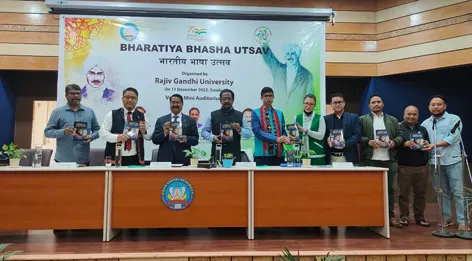RONO HILLS, 11 Dec: Bharatiya Bhasha Utsav, celebrating the birth anniversary of Mahakavi Subramania Bharathi, a multilingual poet and a freedom fighter of India, was celebrated at Rajiv Gandhi University (RGU) here on Sunday.
“The utsav is being observed as there is a need to strengthen ‘language harmony’ to develop an environment conducive to learning more and more Indian languages, apart from mastering one’s own mother tongue,” the university informed in a release.
Addressing the participants, Skill Development & Entrepreneurship Secretary SD Sundaresan sketched out the life history of Subramania Bharathi. Describing Bharathi as a revolutionary writer and a nationalist poet, he also dwelt on Bharathi’s work as a journalist “and his having an extremist view of India’s freedom struggle, in which he had to go to jail.”
The secretary also spoke about the “different literary structure which Subramania Bharathi developed for the common man.”
“In many of his writings, he added that he always conceptualised the idea of India as one. Truly, Subramania Bharathi was a great visionary leader of the country and today we are understanding his importance,” Sundaresan said.
RGU Vice Chancellor Prof Saket Kushwaha stressed on the importance of ‘bhasha’. “Learning our own language builds confidence in oneself,” he said.
Citing the example of former prime minister Atal Bihari Vajpayee delivering his speech in Hindi at the UN, he said that “it’s how knowing one’s language can lead the way.”
He added that “the new education policy provides for learning in our mother tongues, and we should all learn how to develop the link and do KYC – Know Your Country – through language by learning more and more languages.”
The nodal officer of the celebration committee, Prof Simon John said that “the utsav is giving us all an opportunity to write in our own languages and scripts,” and described the celebration as an “empowering moment.”
He added that “one should be sensitive towards other languages also.”
RGU Registrar Dr NT Rikam through videoconference urged the academicians and scholars to “develop written scripts for many known languages of the state.”
“It is the main reason that our languages are less spoken and less studied. Once we develop our scripts, our languages will flourish in the long run,” he added.
RGU Joint Registrar (Academic & Conference) Dr David Pertin dwelt on “the importance of mother tongue languages and how they are envisioned under the national education policy.”
“One should try and encourage others to learn the languages of our fellow Indians, so that one can respect and celebrate other cultures too,” he said, and added that “the university should play a vital role in developing scripts for the Tani languages.”
Social Sciences Dean Prof Sarit Kumar Chaudhuri said that “the development of one community largely depends on its language, especially in a place like Arunachal Pradesh, where many languages are spoken and many are already endangered.”
He too said that “RGU can play a dominant role in tackling the challenges for making the languages vibrant and relevant.”
Various competitions were organised in the run-up to the event, and prizes were distributed to the winners of the ‘speech competition in multilingual’.
A documentary titled Fading Tongue of the East?, produced by RGU’s Centre for Endangered Languages-Arunachal Institute of Tribal Studies (CFEL-AITS) and directed by Kombong Darang, was also screened.
The documentary deals with the fading language of the Meyor tribe of Arunachal.
The utsav also saw the release of a book titled Dictionary and Grammar of Ashing: A Moribund Language of Arunachal Pradesh, published by the CFEL-AITS.




